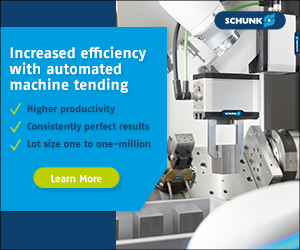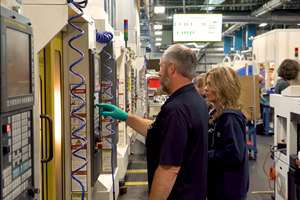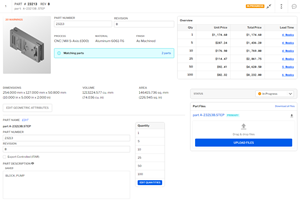Now Is the Time to Digitally Connect Your Factory
People and processes will interact more effectively when digitalization makes it easy to share data on an internet-enabled network.
Share





Industry 4.0, big data, the Internet of Things and the digital factory are terms being pitched around lately, so let’s look at the origin of some of these terms and see how the concepts they represent are changing manufacturing.
Originating in Germany, Industrie 4.0 was planned as a coordinated initiative between the IT world, universities and various manufacturing associations, designed to reshape industry. Now being adopted globally, Industry 4.0, seeks to combine the physical, virtual, IT and cyber systems, thereby creating a new environment in the workplace. The 4.0 part of the name, incidentally, refers to the fourth industrial revolution, the predecessors being mechanization, mass production and computerization, which led to modern concepts of IT and automation.
In truth, Industry 4.0 is less about the future and more about a vibrant collaboration between IT, machine builders, industrial automation integrators and motion control suppliers. This last group is especially important because their products function at the heart of the machines, simultaneously effecting motion, then gathering and transmitting the relevant data to the appropriate control link in the company’s infrastructure. With the recent, rapid expansion of application-specific integrated circuit (ASIC) capability, much more functionality can be built into a product today and this means the manufacturing community must be even more flexible and responsive, not merely reactive, than ever before.
Therefore, the key is getting appropriate data to those who need it the most. The mobile device, tablet, cell phone and now the human-machine-interface (HMI) screen itself can all be useful tools in transmitting the most important data from the shop floor to the top floor, or just down the hall to the front office. (Even the small shop owner must heed this trend and respond appropriately.)
A connected digital factory and the big data it generates provide manufacturers with the insight and agility required to compete.
From our perspective in the motion control and communication platform world, where customers task us with the control, generation or application of movement on everything from a machine tool to an automotive assembly line, we see a great variety of needs among original equipment manufacturers (OEMs) as well as end users. All of them require flexibility and often highly customized solutions to their manufacturing or processing challenges. Plus, maintaining high productivity on aging equipment concerns every company. Is it better to retrofit an existing machine or buy a new one? What is the best mix of robots and skilled operators? Is the answer better asset management or an entirely new business model? Our answers must be based not only on product, but also on software, communication, bus protocol and other areas of expertise.
Likewise, the issue of cybersecurity cannot be understated, as we will soon see a shift from the open to the closed cloud for data storage in a factory or shop network. Protecting intellectual property remains paramount on a global scale today. This effort must involve your suppliers. While technology is key, companies are most productive when they can trust their suppliers, especially those who promote a “defense in depth” approach to cybersecurity.
Another key area is energy management. The more a machine can do with less energy, the more efficient and profitable it becomes. For example, the simple notion of regenerative energy (using an electrical motor to generate electricity as it slows to a stop) can be monitored and manipulated by today’s smart drives, putting power back onto the grid or using it to run other equipment.
Lastly, safety must be considered a priority in digitalization, not only because it protects workers, but also because it contributes to overall efficiency and the profit picture. Fewer accidents happen when repairs are made promptly and equipment is replaced before a malfunction hurts someone. Both preventive and predictive maintenance protocols must be implemented.
A connected digital factory and the big data it generates provide manufacturers with the insight and agility required to compete. Digitalization gives manufacturers the capability to increase productivity across their entire value chain, from design and engineering to production, sales and service, with integrated feedback throughout the process. The results are faster time to market, greater flexibility and higher availability of systems on the plant floor.
Digitalization can be a flexible process, adopted at a pace that fits the organization. Some manufacturers start with retrofits or may begin by digitalizing one area of the shop or even one machine at a time. Whatever path a company chooses to become digitally integrated, the time to start is now.
Related Content
Shop Quotes Smarter, Works Harder with Machine Monitoring
Temco first installed MT-LINKi to optimize quoting. Now, the software helps the shop optimize its machines — and machine purchases.
Read MoreGive Job Shop Digitalization a Customer Focus
Implementing the integrated digital technologies and automation that enhance the customer's experience should be a priority for job shops and contract manufacturers.
Read MoreProcess Control — Leveraging Machine Shop Connectivity in Real Time
Renishaw Central, the company’s new end-to-end process control software, offers a new methodology for producing families of parts through actionable data.
Read MoreEasy-To-Install Data Acquisition System for Real-Time Monitoring Across Brands
cnSEE from All World Machinery Supply combines easy installation and monitoring across multiple machines.
Read MoreRead Next
5 Rules of Thumb for Buying CNC Machine Tools
Use these tips to carefully plan your machine tool purchases and to avoid regretting your decision later.
Read MoreRegistration Now Open for the Precision Machining Technology Show (PMTS) 2025
The precision machining industry’s premier event returns to Cleveland, OH, April 1-3.
Read MoreSetting Up the Building Blocks for a Digital Factory
Woodward Inc. spent over a year developing an API to connect machines to its digital factory. Caron Engineering’s MiConnect has cut most of this process while also granting the shop greater access to machine information.
Read More



























